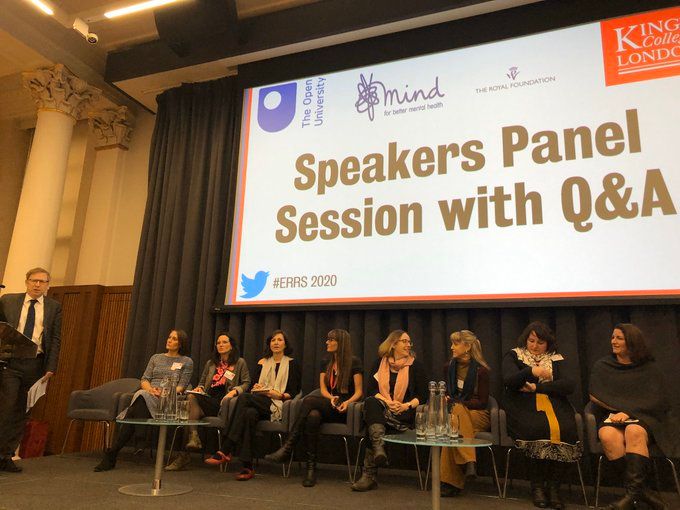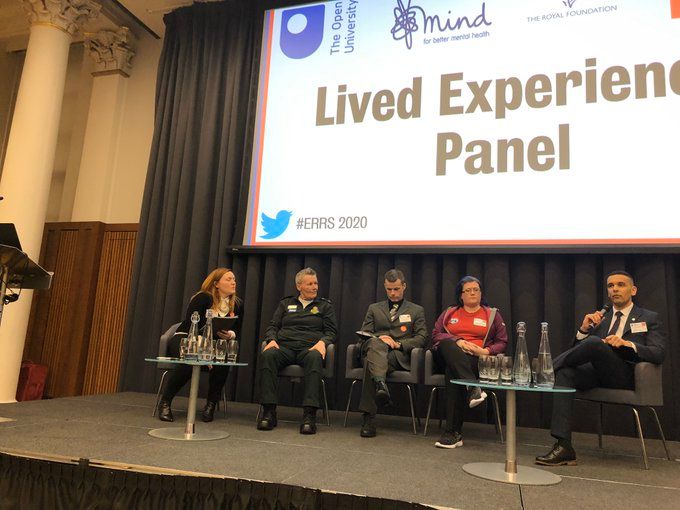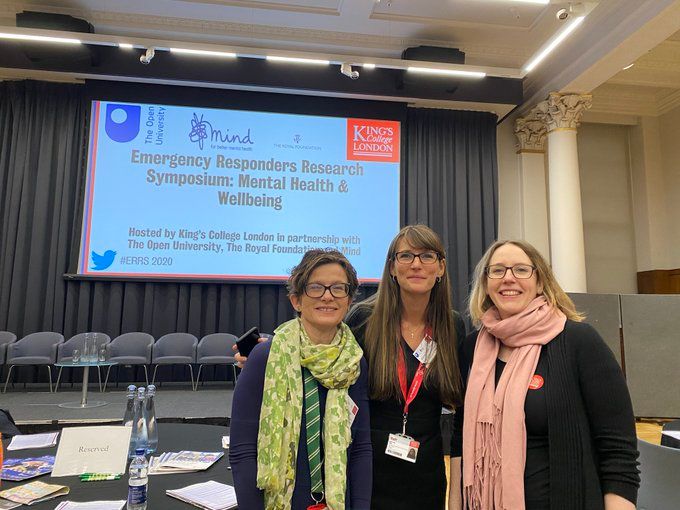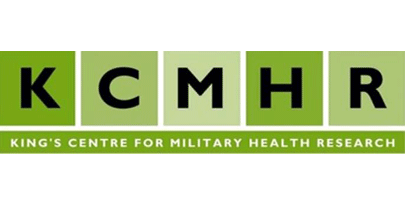Emergency Responder Research Symposium: Mental Health & Wellbeing (ERRS2020)
The inaugural ‘Emergency Responder Research Symposium: Mental Health & Wellbeing’ was held on the 30th of January 2020 at the Great Hall on the Strand. The symposium was hosted by King’s College London in partnership with The Open University, The Royal Foundation and Mind. The symposium aimed to present the most current research, policy and practice pertaining to the mental health and wellbeing of emergency responders (ERs) (including police, fire, ambulance, search and rescue, and other ER volunteer roles) and their families. The day showcased current research, focused on collaboration across the sector, identified gaps in knowledge, presented practitioner and lived experience views, and highlighted priority steps for the future to improve health outcomes for all ERs.
The symposium began with the chair for the day Mr. Paul Farmer, Chief Executive of Mind, Professor Ian Everell, Executive Dean of King’s Institute of Psychiatry, Psychology and Neuroscience (IoPPN) and Karen Hodgson, Programme Manager at the Royal Foundation, opening the day with a warm welcome.
The Minister of State for Crime, Policing and the Fire Service, Kit Malthouse was the keynote speaker who discussed the difficulties of policing and fire roles, and concurrent effects on mental health and wellbeing. He highlighted the Government’s intention to establish a ‘Police Covenant’ and addressed the issue of public assaults on police officers. The Minister took a range of questions, including the query of how might work being done in the policing field be extended to other (voluntary) ER communities, such as Mountain Rescue.
The symposium hosts Dr Gini Harrison from The Open University, Centre for Policing Research and Learning (CPRL) and Dr Marie-Louise Sharp from King’s College London, King’s Centre for Military Health Research (KCMHR) opened a series of talks by presenting their systematic and landscape reviews and discussing the gaps in knowledge regarding the mental health and wellbeing of UK ERs and their families.
Next up, Ashley Austin from Mind discussed the legacy of the Blue Light Programme, their key learnings from 2015 until 2019 and the implications of their work for future research. After this, the symposium heard a series of talks from researchers on various emergency services branches, including the following:
Police: Dr Jess Miller and Dr Magdalena Soffia from Cambridge University and Police Care UK discussed the neuroscience of policing and shared results from the UK’s first survey to assess trauma management and working conditions in UK policing.
Fire: Dr Rowena Hill from the Emergency Services Research Unit at Nottingham Trent University spoke about the wellbeing of emergency service staff, particularly firefighters, and highlighted the importance of supporting families of ERs.
Ambulance: Professor Kristy Sanderson from the University of East Anglia followed with particular mention of sleep and fatigue problems and the associated risks of shift work and long hours without rest in ambulance personnel.
Closing the morning of brilliant talks, an international speaker, Dr Heidi Cramm from the Canadian Institute for Public Safety Research and Treatment (CIPSRT) discussed the latest findings and Canadian experience of the benefits of collaboration of researchers, policy makers and practitioners through the umbrella organisation CIPSRT.
This was followed by our first panel of the day consisting of the morning speakers.

After lunch, Peter Spreadbury from the UK Home Office discussed the Home Office’s 2019 Front Line Review of Policing and the concerns and issues that the review exposed. One such issue was the feeling that the front line was not afforded enough time or space for activities that positively impacted on police wellbeing, such as time for decompression, debriefing, peer support, training and development, counselling or physical activity.
The symposium presented a practitioners panel chaired by Professor Graham Pike from The Open University, CPRL. This second panel consisted of ER wellbeing practitioners who spoke about the successes and challenges of wellbeing programmes in their organisations.
The final panel of the day was a lived experience panel which included individuals from police, fire, ambulance, and search and rescue services who highlighted the realities that ERs face on a daily basis. The panelists shared their own experiences of mental health challenges and suggested provisions that could help improve mental health and wellbeing for all ERs.

The day of invigorating talks and discussions was concluded by discussing the next steps in research, policy and practice with attendees working together to provide feedback and share suggestions for further direction. Some of the main next steps highlighted were:
- Need and appetite for creating a ‘Research Consortium’ – this would be for researchers and practitioners to share research, better practice, encourage collaboration, reduce duplication and translate research into practical wellbeing interventions and support programmes.
- Need to focus on supporting organisations to evaluate their wellbeing programmes and encourage more academic research to assess wellbeing interventions to provide a robust evidence base to target wellbeing programme resources.
- Need to promote and extend support for wellbeing champions, support destigmatising activities and upskill line mangers in mental health and wellbeing leadership skills.
- Need to focus research efforts on understanding the wellbeing needs of ER families and how ER families could be better supported.
The day was closed by Professor Nicola Fear from King’s College London – King’s Centre for Military Health Research (KCMHR) who thanked everyone for engaging in such a productive and interesting day. The full research report by King’s College London and the Open University, ‘Assessing the mental health and wellbeing the UK Emergency Responder community’, will be published later in Spring 2020.

To view some of the presenters' slides from the day please click here.
